
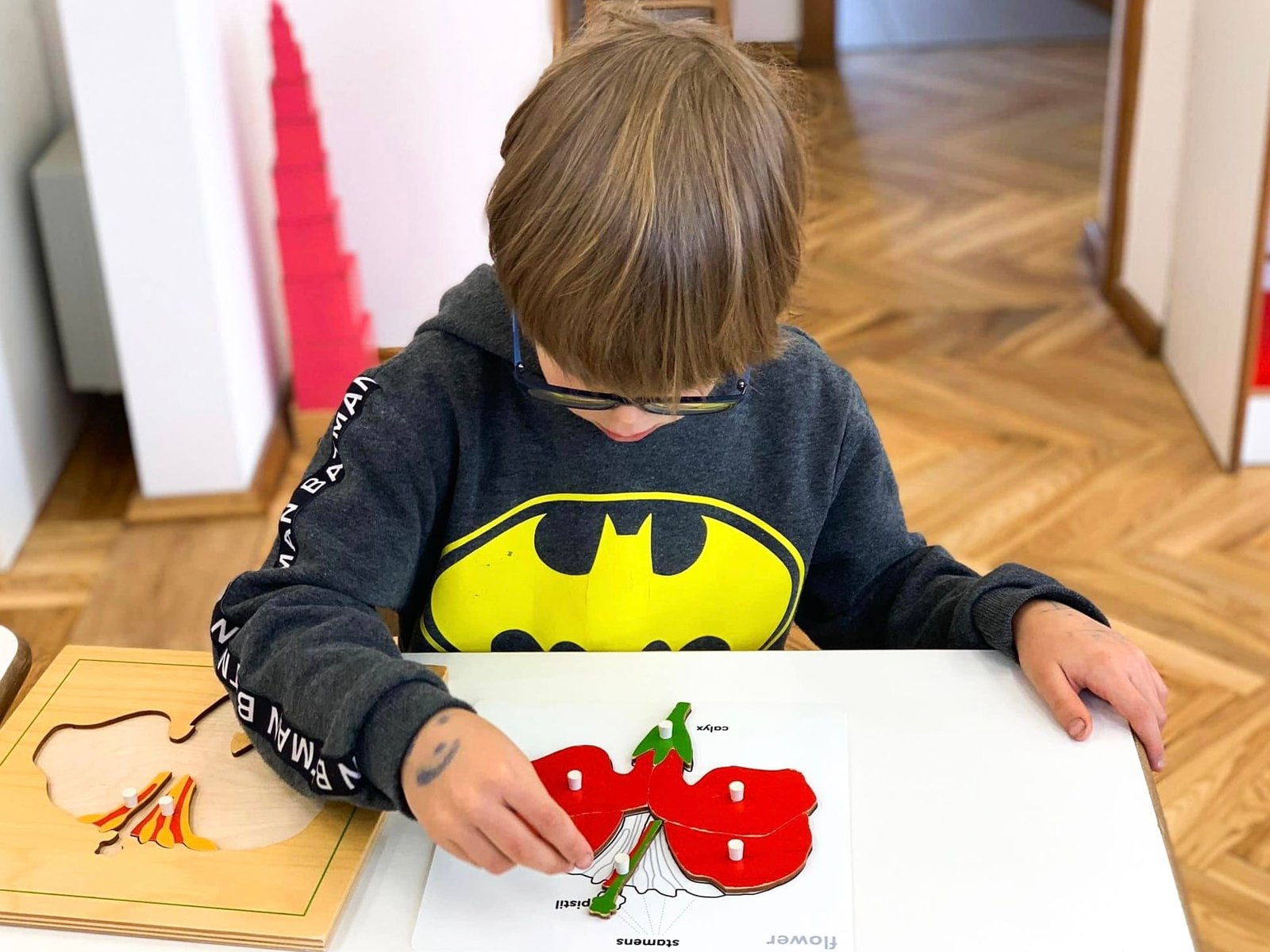
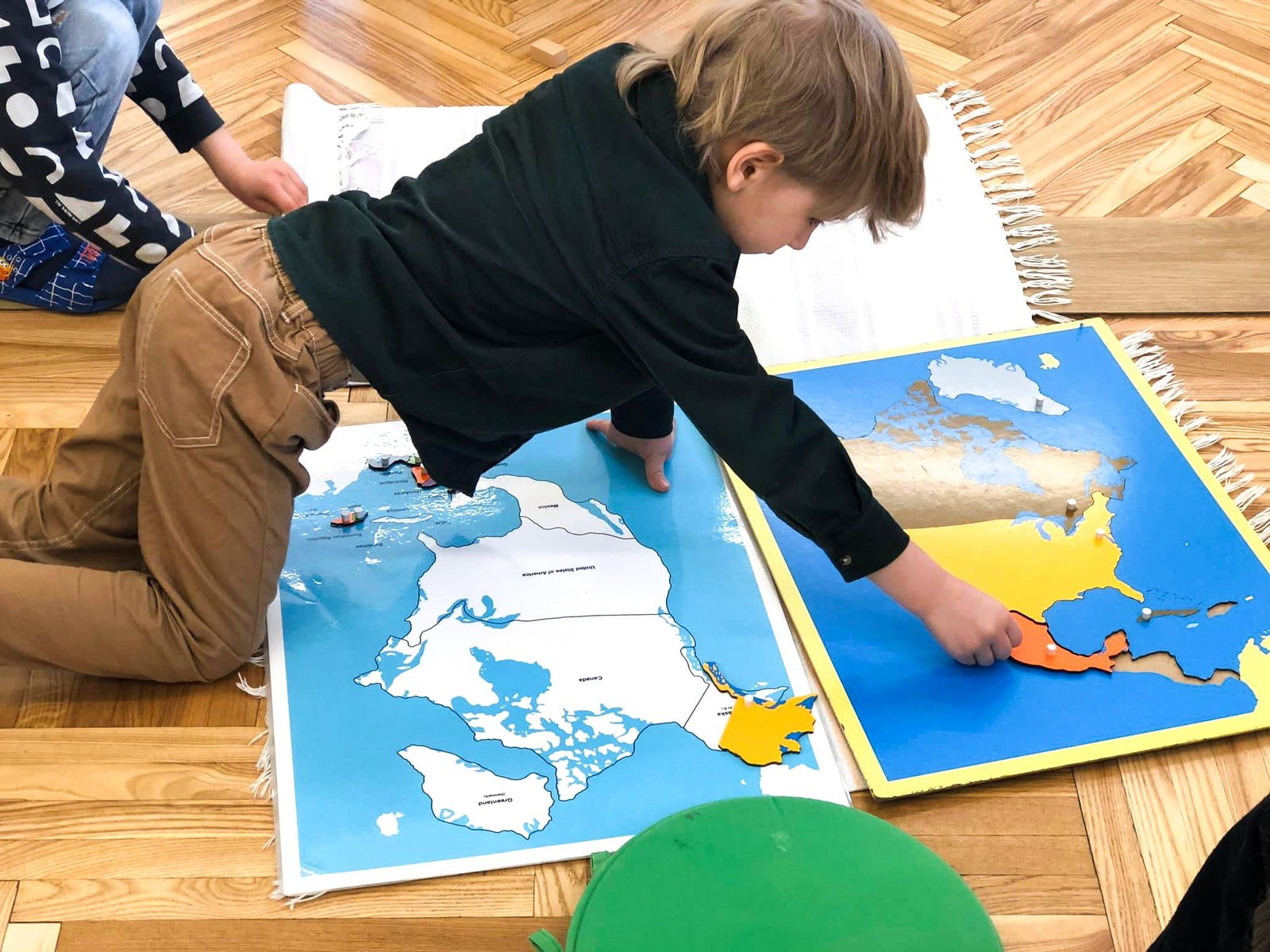
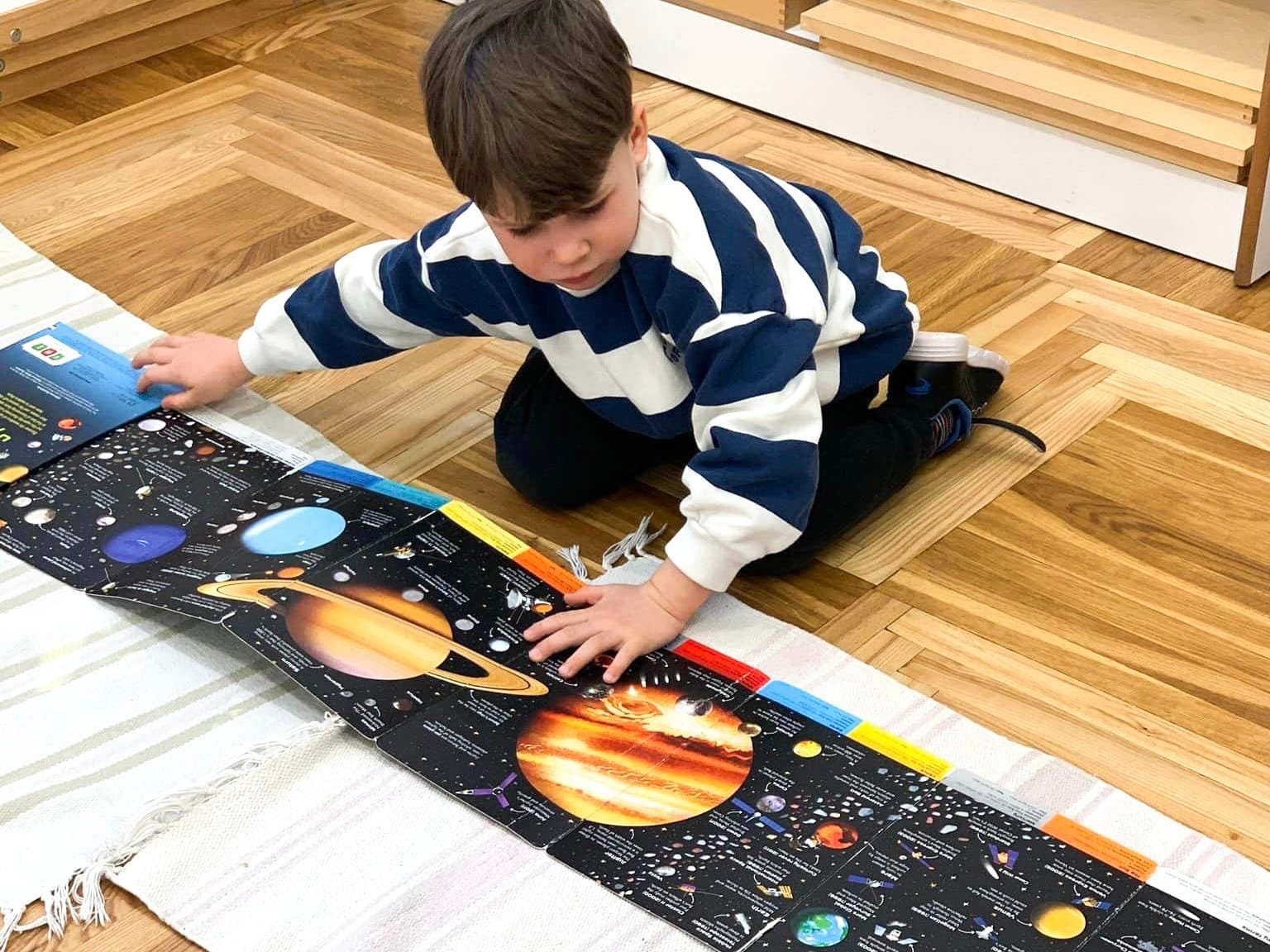
Kas yra Montessori ugdymas?
Montessori ugdymas – tai į vaiką orientuotas mokymosi metodas, kuris pabrėžia pagarbą kiekvieno vaiko individualumui ir natūraliam vystymosi tempui. Šią filosofiją XX a. pradžioje sukūrė dr. Maria Montessori. Ji sukurta tam, kad skatintų vaikų savarankiškumą, tyrinėjimą ir kūrybiškumą, ypač ankstyvame amžiuje (1–6 metų).
Kodėl Montessori ugdymas?
Ankstyvasis Montessori ugdymas skiriasi nuo įprastų žaidimais pagrįstų darželių keliais svarbiais aspektais. Pagrindiniai skirtumai kyla iš:
- - Montessori programos;
- - Montessori ugdymo priemonių;
- - mokytojo vaidmens;
- - ir parengtos aplinkos.
Pagrindiniai Montessori ugdymo principai
„Montessori“ ugdymas siūlo
Personalizuota Programa
Montessori ugdymo programos yra pritaikomos kiekvienam vaikui, atsižvelgiant į jo raidą, interesus ir poreikius. Pamokos su Montessori priemonėmis dažniausiai vyksta individualiai, pagal vaiko pažangą. Mokytojai seka kiekvieno vaiko progresą ir suteikia pagalbą ten, kur reikia.

„Montessori“ ugdymas siūlo
Mišraus amžiaus klasė
Montessori klasėse vaikai ugdomi mišraus amžiaus grupėse. Tai turi dvejopą naudą:
- - jaunesni vaikai mokosi iš vyresniųjų,
- - o vyresnieji įtvirtina žinias, padėdami jaunesniems.
Tokiu būdu klasė tampa tikro gyvenimo atspindžiu, kuriame vaikai mokosi bendradarbiauti su skirtingo amžiaus ir interesų žmonėmis.

„Montessori“ ugdymas siūlo
Parengta aplinka
Montessori klasė vadinama „Parengta aplinka“, nes mokytojas ją specialiai organizuoja taip, kad skatintų geriausią mokymosi patirtį. Aplinka pasižymi grožiu, tvarka ir prieinamumu:
- - baldai ir priemonės pritaikyti vaikams,
- - lentynos atviros ir lengvai pasiekiamos,
- - kiekviena priemonė turi savo vietą ir tikslą.
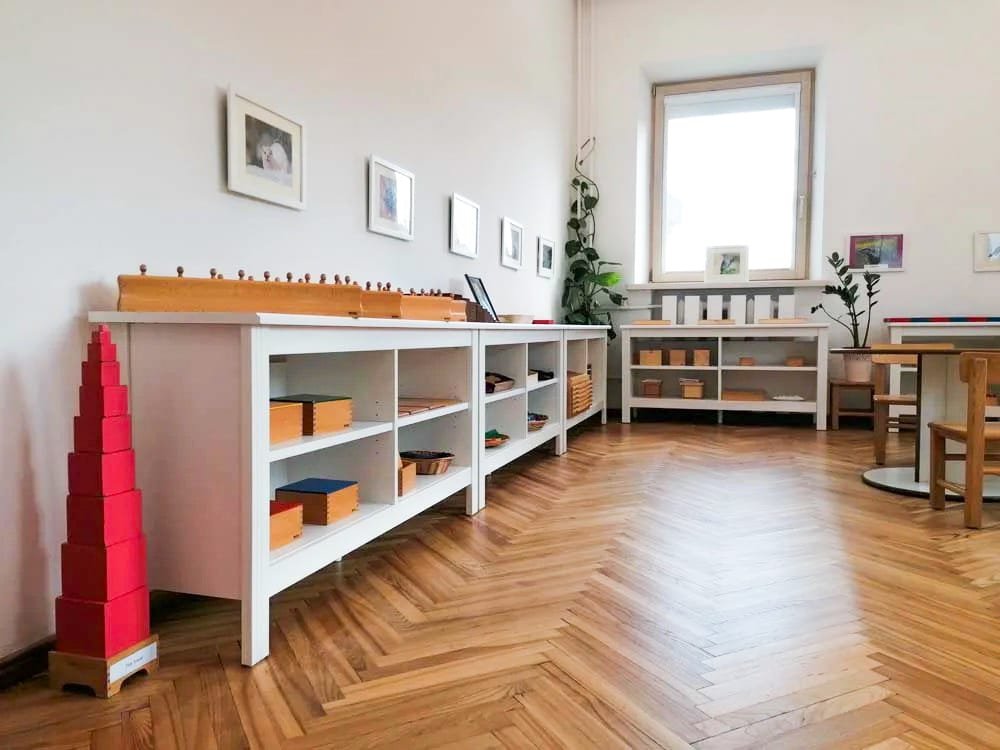
„Montessori“ ugdymas siūlo
Montessori priemonės
Montessori priemonės – tai specialūs mokymosi įrankiai, kurie padeda vaikams įgyti žinių per praktinę patirtį. Kiekviena priemonė lavina konkrečią sąvoką ar įgūdį, turi savaiminės kontrolės mechanizmą, leidžiantį vaikui pačiam pastebėti klaidas ir mokytis savarankiškai. Vaikai, naudodami priemones, gali palaipsniui gilinti žinias, nes užduotys tampa vis sudėtingesnės.

„Montessori“ ugdymas siūlo
Visapusiškas ugdymas
Montessori ugdymas akcentuoja intelektinį, fizinį, emocinį ir socialinį vystymąsi. Programa apima ne tik kalbą ir matematiką, bet ir:
- - praktinius gyvenimo įgūdžius,
- - sensorinius pratimus,
- - kultūros studijas.

„Montessori“ ugdymas siūlo
Laisvė judėti ir rinktis
M. Montessori pastebėjo, kad vaikai geriausiai mokosi tada, kai turi laisvę judėti, rinktis veiklas ir sekti savo interesus. Montessori klasėje vaikai gali:
- - patys pasirinkti užduotis,
- - dirbti savo tempu,
- - mokytis per praktinę patirtį.
Ši laisvė derinama su aiškiomis ribomis, kurios padeda vaikams ugdytis atsakomybę ir pagarbą aplinkai bei kitiems.

„Montessori“ ugdymas siūlo
Vidinė motyvacija
Vilniaus Montessori darželyje tikime, kad geriausias mokymasis vyksta tada, kai vaikus veda vidinė motyvacija – natūralus noras tyrinėti ir atrasti. Todėl mes nesiekiame motyvuoti vaikų išoriniais apdovanojimais, o ugdome jų smalsumą ir meilę mokymuisi visam gyvenimui.

„Montessori“ ugdymas siūlo
Savimokos principas (Auto-Education)
Vienas svarbiausių Montessori metodikos principų – įsitikinimas, kad vaikai yra pajėgūs mokytis savarankiškai, kai jiems suteikiamos tinkamos sąlygos. Montessori priemonės sukurtos taip, kad skatintų šią galimybę, o mokytojo užduotis – paruošti aplinką ir švelniai lydėti vaiką jo mokymosi kelyje.

„Montessori“ ugdymas siūlo
Laisvė su ribomis
Montessori aplinkoje laisvė reiškia galimybę vaikui rinktis veiklą, tyrinėti savo interesus ir mokytis praktiškai. Tačiau ši laisvė visada egzistuoja su ribomis – jos padeda vaikui ugdytis savikontrolę, socialinius įgūdžius ir atsakomybę.
In the Montessori classroom, freedom is not merely the absence of restrictions; it is the opportunity for children to choose their paths in learning. This autonomy empowers them to follow their interests, make decisions, and take ownership of their educational journey. By allowing children the freedom to select activities, they engage more deeply, fostering intrinsic motivation and a genuine love for learning. This self-directed exploration leads to a greater understanding of their own abilities and preferences.
While freedom is essential, it must be accompanied by limits. Limits provide the necessary boundaries within which children can explore safely and constructively. These boundaries are not arbitrary; rather, they are carefully designed to promote respect for oneself, others, and the environment. In a Montessori classroom, limits might include guidelines for group work, respect for materials, and the importance of maintaining a peaceful learning environment.Establishing limits teaches children about responsibility and the consequences of their choices. It helps them navigate social interactions, understand the needs and feelings of others, and develop self-discipline. These skills are crucial not only in a classroom setting but also in life beyond school.

„Montessori“ ugdymas turi
Mokytojo vaidmuo
Montessori mokytojas yra ne tradicinis dėstytojas, o gidas. Jo užduotis – stebėti vaiką, atpažinti jo poreikius, pasiūlyti tinkamas veiklas ir užtikrinti ramią, tyrinėjimui palankią aplinką. Mokytojas padeda vaikui atrasti savo kelią, bet nesikiša į procesą, kol tai nėra būtina.

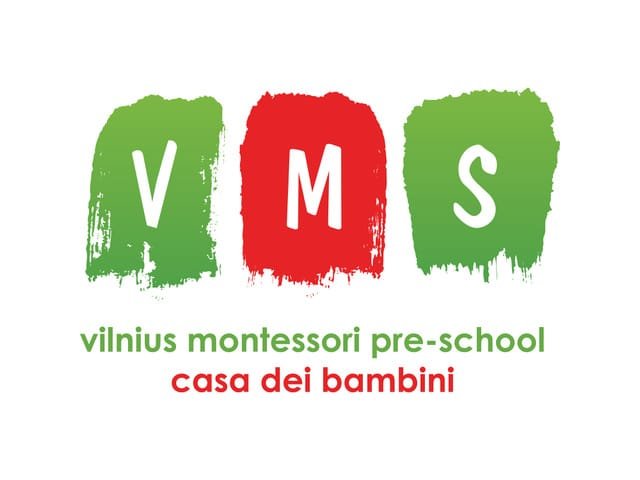






 VMS tėvų vadovas
VMS tėvų vadovas  parsisiųsti
parsisiųsti VMS Academic calendar
VMS Academic calendar  VMS fees
VMS fees  Latvių G. 16A Vilnius 08123
Latvių G. 16A Vilnius 08123 +370 655 08414, +370 640 70875
+370 655 08414, +370 640 70875 admin@vms.lt
admin@vms.lt  Pir-Pn 11:30 – ir toliau
Pir-Pn 11:30 – ir toliau